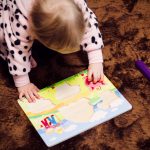Every year in November World Nursery Rhyme Week takes place. Schools, early years services and parents are invited to take part in the rhyme a day challenge. Why? Because research shows that great rhymers, make great readers!
Songs and rhymes are a cornerstone of language development, positive interaction and early learning in childhood. Some of your earliest memories may be of a family member or friend singing a rhyme with you. This is because from before we are born, our ears tune in to the rhythms and sounds of language. The sound of your mother’s heartbeat was the first rhythm you knew!
As young children hear and practice rhymes and songs, they tune in to the rhythm of language in sounds, words and phrases. They also hear and practice inflection, pitch and facial expression. Most importantly, this fundamental learning happens in a fun and positive way between children and adults.
In early infancy, nursery rhymes and songs pave the way for language, learning and communication. When we sing songs and rhymes with young children we are letting them hear repetitive lines and listen to the sounds of language. Babies are learning to look at faces and interpret meaning in facial expression. They are also learning to listen and begin to anticipate sounds and actions. Babies will often move their arms and legs in enjoyment, look intently at us or make sounds while we sing rhymes and songs. These are their signals to us, letting us know they are happy and keen to get involved.
You can help your child to get involved in songs and rhymes by following this guidance:
- Go slowly
- Use actions
- Get face to face at your child’s level
As children grow they continue to enjoy and benefit from nursery rhymes because they:
- Have familiar patterns and they help children to learn easy recall and memorisation.
- Often tell a story with a beginning, middle and end. This teaches children that events happen in sequence, and they begin to learn how to understand and follow stories.
- Expose children to vocabulary they might not usually hear e.g. ‘fetching a pail of water’, ‘water spout’, ‘speckled’.
- Use patterns and repetitive structures, so children begin to learn simple maths skills as they recite them. Many rhymes also use numbers, counting, and other maths words that children need to learn, such as size and weight.
Research has shown that awareness of rhyme and the ability to sing songs and rhymes positively supports children’s language development and early literacy and reading skills. The saying ‘great rhymers, make great readers’ holds true considering the range of essential communication and language skills children learn through rhymes and song.
Have some fun with your little one and try these nursery rhymes with them as part of Nursery Rhyme week!
Body Awareness Rhymes
Round and round the garden
Like a teddy bear,
One step,
Two steps,
Tickle you under there!
Round and round the garden
Like a little mouse,
One step,
Two steps,
Into his little house!
Movement and Action Rhymes
Row, row, row your boat gently down the stream,
Merrily, Merrily, Merrily, Merrily,
Life is but a dream!
Row, row, row your boat gently down the stream,
If you see a crocodile,
Don’t forget to scream!
Rock, rock, rock your boat roughly down the river,
If you see a polar bear,
Don’t forget to shiver!
Row, row, row your boat slowly to the shore,
If you see a lion there,
Don’t forget to roar!
See our resource ‘Rhyme Time Fun’ for more at www.loveparenting.ie/resources.
This article was contributed by Speech and Language Therapists with ABC Start Right and the HSE Mid-West Speech and Language Therapy Department. Both are part of Parenting Limerick, a network of parenting and family support organisations.




